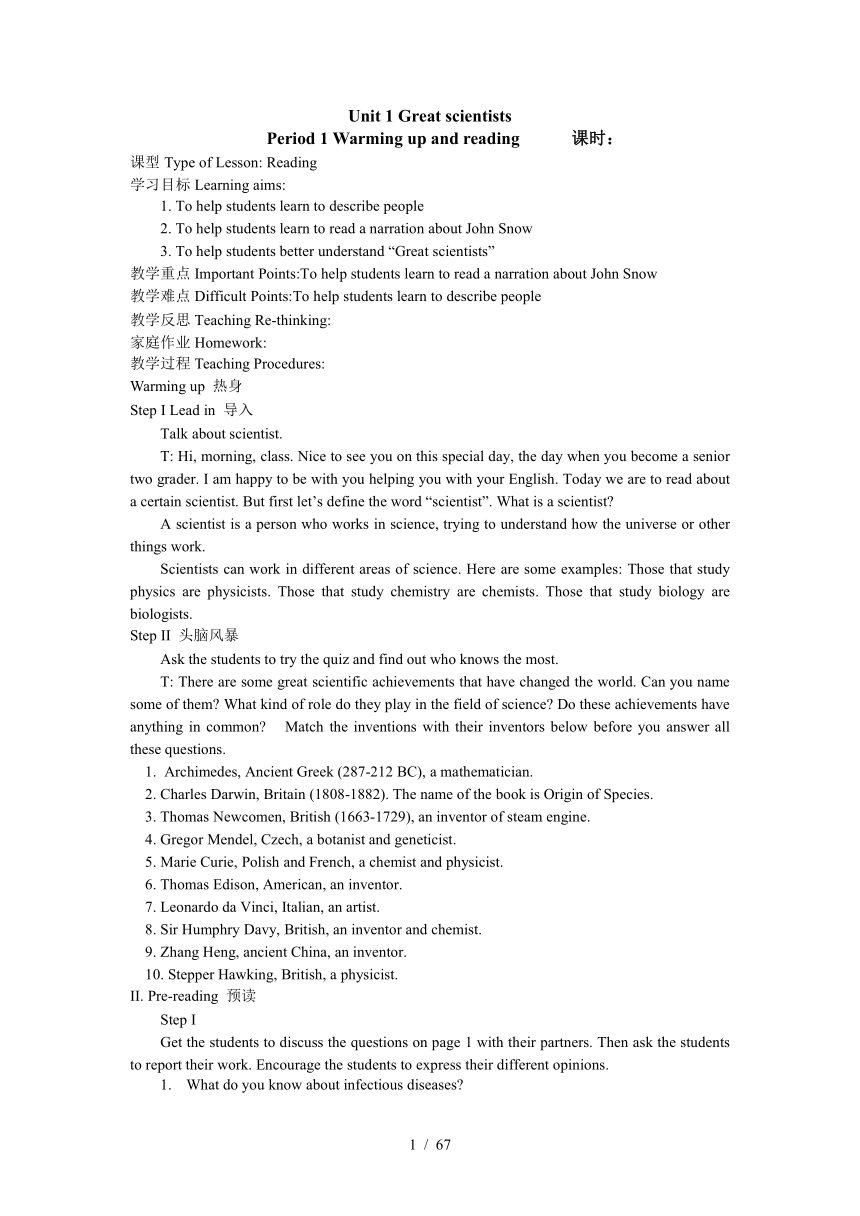
Unit 1 Great scientists Period 1 Warming up and reading 课时: 课型Type of Lesson: Reading 学习目标Learning aims: 1. To help students learn to describe people 2. To help students learn to read a narration about John Snow 3. To help students better understand “Great scientists” 教学重点Important Points:To help students learn to read a narration about John Snow 教学难点Difficult Points:To help students learn to describe people 教学反思Teaching Re-thinking: 家庭作业Homework: 教学过程Teaching Procedures: Warming up 热身 Step I Lead in 导入 Talk about scientist. T: Hi, morning, class. Nice to see you on this special day, the day when you become a senior two grader. I am happy to be with you helping you with your English. Today we are to read about a certain scientist. But first let’s define the word “scientist”. What is a scientist? A scientist is a person who works in science, trying to understand how the universe or other things work. Scientists can work in different areas of science. Here are some examples: Those that study physics are physicists. Those that study chemistry are chemists. Those that study biology are biologists. Step II 头脑风暴 Ask the students to try the quiz and find out who knows the most. T: There are some great scientific achievements that have changed the world. Can you name some of them? What kind of role do they play in the field of science? Do these achievements have anything in common? Match the inventions with their inventors below before you answer all these questions. Archimedes, Ancient Greek (287-212 BC), a mathematician. 2. Charles Darwin, Britain (1808-1882). The name of the book is Origin of Species. 3. Thomas Newcomen, British (1663-1729), an inventor of steam engine. 4. Gregor Mendel, Czech, a botanist and geneticist. 5. Marie Curie, Polish and French, a chemist and physicist. 6. Thomas Edison, American, an inventor. 7. Leonardo da Vinci, Italian, an artist. 8. Sir Humphry Davy, British, an inventor and chemist. 9. Zhang Heng, ancient China, an inventor. 10. Stepper Hawking, British, a physicist. II. Pre-reading 预读 Step I Get the students to discuss the questions on page 1 with their partners. Then ask the students to report their work. Encourage the students to express their different opinions. What do you know about infectious diseases? Infectious diseases can be spread to other people. They have an unknown cause and need public health care to solve them. People may be exposed to infectious disease, so may animals, such as bird flu,AIDS, SARS are infectious diseases. Infectious diseases are difficult to cure. What do you know about cholera? Cholera is the illness caused by a bacterium called Vibrio cholerae. It infects people’s intestines(肠), causing diarrhea and leg cramps (抽筋). The most common cause of cholera is by someone eating food or drinking water that has been contaminated(污染) with the bacteria. Cholera can be mild(不严峻的) or even without immediate symptoms(症状), but a severe case can ... ...
~~ 您好,已阅读到文档的结尾了 ~~

